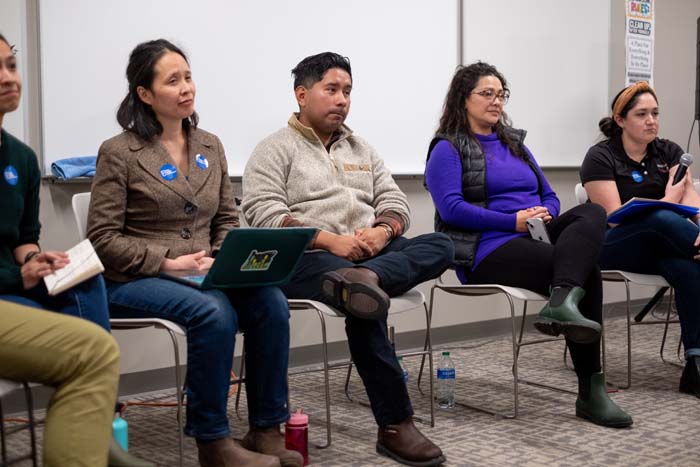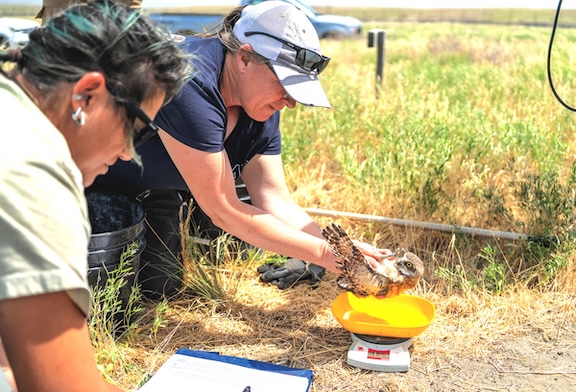West comes east: Westside government leaders trekking to Eastern Oregon
Published 11:00 am Thursday, December 14, 2023

- From left, Oregon House Reps. Khanh Pham, of Southeast Portland, Ricki Ruiz, of Gresham, and Annessa Hartman, of Gladstone, all Democrats, attend a community water issue meeting Nov. 27, 2023, at Blue Mountain Community College in Boardman. The three officials came to the east side of the state to learn about the water crisis in hopes of finding a solution for the people of the Boardman region.
PENDLETON — The new director of the Oregon Department of Education and deputy superintendent of Public Instruction on Tuesday, Dec. 12, visited two innovative early childhood education facilities in Pendleton.
Trending
Charlene Williams has served as ODE director since July 12. She said she made the Pendleton visit to observe progress in early childhood education and take information back to Salem.
“I think it’s important for any leader to be in contact with what’s happening on the ground and hear how things are impacting education,” Williams said. “We can take that information back and change the way we implement some of our policies. We’re getting good feedback. Some of the way we administer grants are impacting districts. We are hearing needs like more training for behavioral health and social and emotional learning needs and just to really hear directly from people instead of through email.”
Williams’ visit marks the latest example of state leaders on the west side of Oregon touching down on the eastern side of the state.
Trending
Williams visited the Pendleton Early Learning Center where she had lunch with kindergarten students, visited a Umatilla language class, where the young students sang a Christmas song in the Umatilla language for her. She visited the Early Childhood Special Education section, Head Start and the office for the Special Supplemental Nutrition Program for Women, Infants and Children.
“This is what it means to really experience and see children so we don’t lose sight of who we’re serving — everybody,” Williams said. “This is whom we are called to serve, whom we need to be in contact with.”
Williams said she would like to further tour public education facilities in Eastern Oregon.
“Earlier I got to tour Malheur County, Vale and Adrian, and then I’m over here in Pendleton and will be in other regions of the state,” Williams said. “The goal is to hit all of our 19 educational service districts. So that, again, how does it feel? How can we be even more supportive and responsive?”
Gov. Tina Kotek, who appointed Williams, is on board with bridging the state’s east-west divide.
“My visits in Eastern Oregon counties this year affirmed the value of being in community, listening to people,” she said. “No government can solve challenges it doesn’t fully understand, and it’s no secret Eastern Oregon hasn’t felt heard. State government needs to work for Oregonians in every part of the state. It’s always encouraging to see legislators from the west side of the state taking the time to know Eastern Oregon better.”
Hansell pushes for bridging the divideSen. Bill Hansell, R-Athena, has been a big proponent of bringing westside lawmakers from the other side of the aisle to Eastern Oregon as a way to find common ground toward what he called better legislation.
He said it all started a decade ago when environmentalists and ranchers were in a legal battle over what to do about increasing livestock depredation by wolves in Eastern Oregon. Hansell, a freshman state senator at the time, had found himself on the Natural Resources Committee.
The chair of the committee was former Oregon State Sen. Jackie Dingfelder, a Democrat from Portland.
“I was a new member of her committee,” Hansell said. “She reached out to me and we met and struck up a really nice friendship and she asked me what were the issues of concern in my district. I told her about the wolf issue. That it was tied up in court and we needed to do something because there was a whole lot of frustration and we didn’t have good public policy.”
Hansell said he brought Dingfelder out to the region to meet ranchers in addition to meetings with environmentalists.
After returning from the trip, Hansell said he and Jackie “asked the judge if he would be willing to wait to see if, legislatively, we could answer the question.”
The result was House Bill 3452, which then-Gov. John Kitzhaber signed into law. The legislation provided producer rights for lethal take after depredation under certain conditions.
“I went up and I thanked Jackie for all her work in making this happen, and she said something to the effect of ‘Bill, it wouldn’t have happened without you,’” Hansell said. “I said, ‘That may be so, but you came out. You were a co-sponsor. You were in a position of leadership. It was your leadership that helped move it and thank you for coming out and meeting with the stakeholders.’”
Crisis brings policymakersFour Democrats House representatives from the Portland area and members of the Black, Indigenous and People of Color Caucus visited Boardman in November to take in firsthand the contaminated groundwater crisis in the area.
“This is really a fact-finding mission so we can go back to our colleagues and do more research, and discuss with our state agency partners about what are the options,” said Rep. Khanh Pham, of Southeast Portland.
Annessa Hartman, vice chair of the House Committee on Agriculture, Land Use, Natural Resources and Water, was a part of that mission.
“I found out about this issue when I first got elected as the vice chair of my committee and immediately was surprised this issue had gone on for so long,” Hartman commented at the time.
Hansell said bringing Dingfelder to Eastern Oregon was a good lesson learned.
“How do we expect people from outside of our district, from a different part of the state, to know what our issues are if they never know what they are?” he said.
Since then, he’s made a regular effort through the years to bring out westside lawmakers to meet face to face with the stakeholders of Eastern Oregon on the issues that concern them.
“Now they don’t always 100% agree, but at least they understand, and we look for middle ground,” he said. “By building relationships, either having people come out and understand or they’ve already been out here and we have the friendship (established), we can say, ‘Look, this is really bad for us and here’s why and here’s the solution.’ You get far better policy.”
Getting Legislature on board is the goalAfter Williams and the entourage toured the Pendleton Early Learning Center, they walked two blocks on Southwest Frazer Avenue with Kathryn Brown to view one of her favorite community projects, the Pendleton Children’s Center, the former senior center that has been revamped to provide child care services.
Brown is a founding director of the center and serves as secretary-treasurer.
The nearly completed part of this development is the 75-year-old Quonset hut structure that used to be a gymnasium for a former Seventh-day Adventist church and school, before it became the senior center.
“When we first walked in here, it had many decades of deferred maintenance,” Brown explained to Williams and the group. “No fire sprinklers, a drop ceiling, no natural light. It was grim, but so far we’ve spent about $1.5 million, and some of that from philanthropy.”
Brown said the city of Pendleton put in a new water line on the street so fire sprinklers could be installed, “because it’s obviously a wood-frame building and that was our priority.”
Brown said the funding was aided by “a lot of donations from local individuals and businesses.”
“We opened last fall with two preschool classrooms on the far end, which accommodate 36 children,” Brown said, “and there’s an adjacent restroom with three adorable little toilets, which I’m sorry we can’t show you because the children are napping.”
In January the center will be opening enrollment for another 36 infants, toddlers and preschoolers.
Brown said with more funding and expansion into the former Seventh-day Adventist Church building that fronts the property, the child care center could serve up to 150 children.
Williams said many education programs can advance with support from the Oregon Legislature.
“There are so many in the legislative body that are supportive, starting with the education committee leaders and members who have a passion around education,” Williams said, “ensuring students have what they need and teachers have what they need as leaders. I find that most people, if we can give them the information they need, they’ll be supportive of helping kids in Oregon.”









